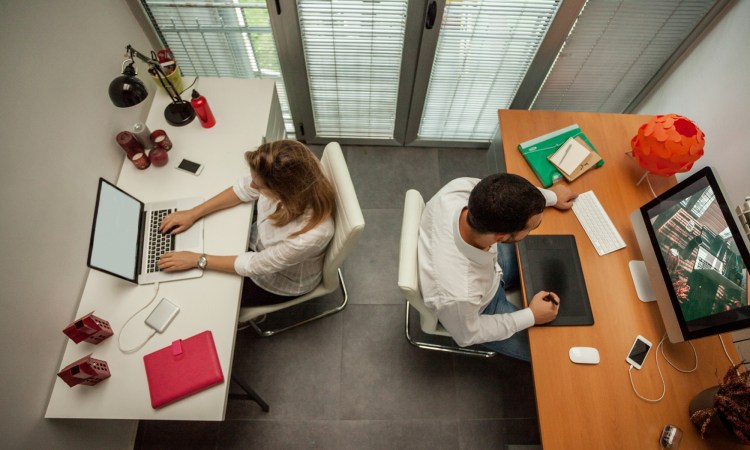
Within hours, I was getting texts. And FB messages. And then a call from a quasi-terrified sounding former student: “Any articles or books you can suggest about how my spouse and I spend the next many weeks together in our tiny apartment without offing each other?”
Then, as if on cue, my husband of 28 years walks into our kitchen with the mail. Without so much as a wash of the hands or a spray of disinfectant, he casually places the pile — as our pre-pandemic ritual would dictate — on our stainless steel kitchen island.
“WHAT IN THE HELL ARE YOU THINKING?!” I yelled at him.
A new chapter in my marriage — and in so many other people’s relationships — is suddenly, and without warning, upon us.
Hello, pandemic; goodbye, routine.
Hello, life now filled with work-from-home mandates, new stressors, makeshift computer stations, evaporating personal space, and new negotiations about, well, almost everything.
It’s clear that there is indeed a new reality for all of us. And it’s not an easy one — marriages and partnerships in practically every country around the world are now under stress.
But there is hope. Stress doesn’t have to result in a complete systems failure. As a marriage researcher and social scientist who studies and teaches about the micro-dynamics of thriving marriages, I’m happy to share some evidence-based insights that can help you and your partner navigate the weeks and months ahead as your relationship calibrates to this new normal.
No matter your age, stage of life or length of marriage, we must acknowledge this fact: We’re all experiencing losses at the moment. You are. Your partner is. For some of us, the losses are immediate and frightening, even grave. People are losing their jobs. Their businesses. And some have lost loved ones, friends, neighbors or colleagues.
For many, the losses in our lives may not be as tangible, but they still hurt. All pain is real pain. In fact, take a moment in the next day, if you can, and ask your partner: “What do you miss most from life ‘before’ quarantine?” No matter their response, you have just one job: Listen with an open heart, do not offer a fix-it response, and then reach out and hold them tight in a big, 60-second-plus embrace.
The strongest theme emerging among the many couples I’ve talked to is the widespread, unsettling undercurrent of all of these ambiguous losses in our lives. Even the happiest of couples are feeling the weight of financial shifts, dwindling space, and a yearning for the return to old rituals and routines. For many couples, the mundane moments of life “before” have become attractive, almost nostalgic: regular bedtimes, morning commutes, coffee in to-go mugs, end-of-day greetings, day-in-review dinnertime conversations, built-in daily autonomy, and even the predictable irritations of living as a couple. We didn’t know how much we loved how boring it was — and now that we can’t have it, we want it.
The good news: Once we acknowledge our losses, there is a lot that a couple can do, proactively, to not only survive quarantine but actually thrive through it.
It starts by shifting your perspective. What if we tried to embrace this new, weird time together as an opportunity or a reset? What if we saw this as a chance to intentionally develop new and improved ways of being with each other? I’ve studied this kind of co-creating in my own research with couples.
One of the findings is that when you and your partner recognize that you are creators of your own relationship mini-culture — your rituals of connection form the pillars of this culture — then you are more likely to choose, build and sustain them.
What is a ritual of connection?
According to researchers like William Doherty, therapist, professor and author of The Intentional Family, a ritual of connection is any way that you and your partner regularly turn toward each other. It could be emotional, physical, spiritual, you name it. They might be so mundane that many couples wouldn’t even call them rituals. It could be the way you greet each other at the end of the day when you reunite after work; the midday text to coordinate kid-pick up; the little prayer you say together before you drift off to sleep; and even the little phrases you use that have private meaning just between you and your spouse. Even a nickname is a tiny verbal ritual; it says to your partner “I know you in a way that no one else does.”
Research reveals that strong and meaningful rituals build strong marriages. They stitch couples together, giving them a sense of “we have each other’s back” and we’re in this together. And because rituals are rooted in a sense of predictability they are quietly comforting, they can reduce fear and counter stress both on the average day and in times of great uncertainty. Which is precisely what we have at the moment.
As a relationship ritual researcher myself, it’s been thrilling to hear the way many couples have been using this time as an opportunity to creatively grow new rituals.
A couple I’ll call Chad and Shawn have established a new rule or “ritual” to help them navigate living and now working in their small apartment. And it’s brilliant. Each spouse has chosen a special sweatshirt — and wearing it comes with a rule. When the other spouse sees you in it, they have to pretend you are invisible. No talking to them, no looking at them, no asking a question. It’s the marriage version of an invisibility cloak, a creative way to build in distance without having to verbally request it.
Another couple, like some others, are mourning the loss of their old morning routine, now that days/nights/work/leisure blur together without clear boundaries. So after a week or so of angst, they began a new practice. They get dressed in their work clothes, pack their lunches, and kiss each other goodbye. Then each of them walks out the front door, around the block (separately), and then back in the door (separately), ready to begin their work days. They do the same later in the day to mark the end of work and the beginning of family time.
Many couples are navigating quarantine with school-age or adult children who’ve come home to shelter. Two families separately shared they have instituted “themed dinners” once a week in their homes, with everyone “required” to dress the part. Hawaiian pizza and mai tai, anyone?
Then there’s this idea, one that I’m strongly suggesting to my own husband we promptly steal. This couple has made two laminated copies of a “one free pass today” card, and it expires at 11:59PM every night. Once a day, you hand it over to your spouse when you’ve done something stupid, said something mean, or forgotten to do something you promised.
One couple shared a beautiful new ritual that’s emerged since entering quarantine; they call it their “reconciliation walk.” After their workday is over and before they sit down for dinner, they take a stroll around the neighborhood, apologize for “any missteps we had with each other, and then hit reset for the evening.” It works. In fact, in the words of one spouse in this marriage: “by the end of the walk, we are no longer maintaining appropriate social distancing.”
Another couple has turned to the past for their ritual. They’ve decided to go back and re-read 15-years’ worth of their annual Christmas letters. They said: “We have gone back to when we first got married, and are reading them out loud to our kids who weren’t even around during that time. We laugh, and they ask questions about what things were like.” This same duo has dug out a box of the husband’s grandfather’s letters: “Bob’s grandfather wrote Bob a letter every week for 10 years. We read those as well. His grandfather was a preacher and an incredible man. His letters are uplifting and so wise.”
Similarly, another couple has pulled out the stash of children’s books — the favorites from when their now-grown children were toddlers. They pick one a night and read it out loud to each other but with a twist. They discuss how the characters in the book are similar to characters in their current, actual lives. What a great, creative conversation-starter — and a great way to learn more about some of the dramas in your spouse’s work life.
If you don’t have a box of letters or a shelf of kids’ books, no worries. You can invent your own ritual that incorporates a sense of humor and playfulness. Take the couple who has picked a random household object (I wish they had told me what it is; I’m picturing a tiny plastic squishy pig?) and invented a new game. They hide it somewhere in the house each day. If your spouse doesn’t find it, they’re on call to make the cocktails that evening.
The last example is one that I’ve told my own spouse we are absolutely adopting. Like so many others, this couple found that conflict in their marriage has increased during quarantine, and their own emotional reserves have decreased. So they’ve created a list — a place to “hold” all of their complaints. Their plan is to review the list each weekend. So far, most things on it are being waitlisted for post-quarantine times, but they predict many of these items will be irrelevant and long-forgotten by then. The list is a powerful bit of problem-solving that also gives them somewhere they can safely place their frustrations.
Couples: What will you do with this weird new time in your life? The research suggests that the tiny things we do can often have a big, positive impact. While you can’t control the world, you can stay home, stay safe and focus on what you can: Each other.
Watch her TEDxMinneapolisSalon Talk here:














